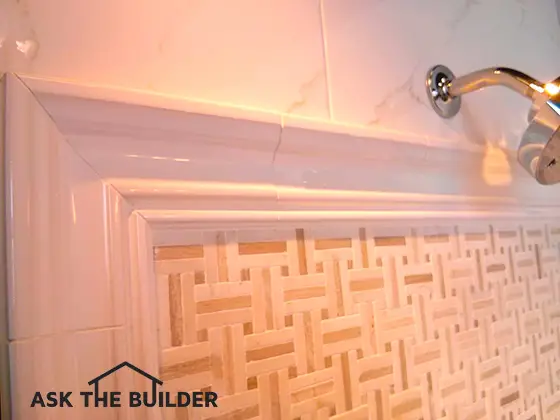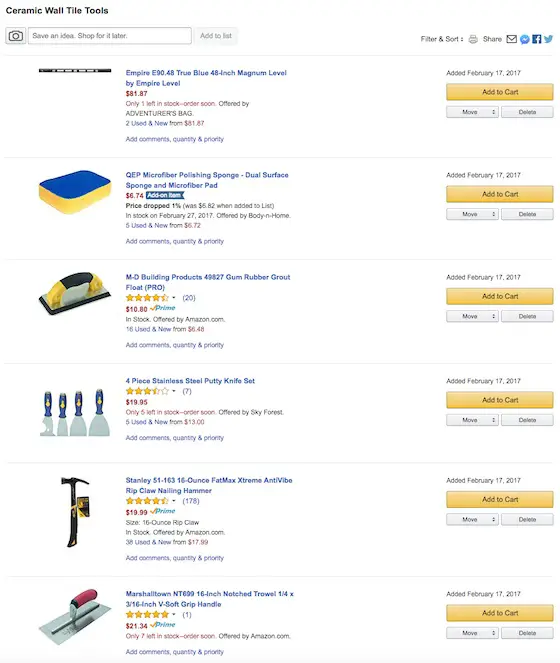Ceramic Tile in Shower

If you can stretch your budget you can have fancy ceramic tile in a shower. © 2016 Tim Carter Builder
DEAR TIM: I’m remodeling my bathroom and want the WOW factor when I see it each day. Regular square tile seem so boring.
What would you suggest to create a look that will put someone’s head on a swivel when they see it?
What are the best practices, in your opinion, when it comes to installing ceramic tile that will not fall off the wall and not leak?
I don’t want any issues and want this tile to look as good as the 100-plus-year-old tile in my grandmother’s distinguished old home. Sara J., Lincoln, MA
DEAR SARA: You’ve given me a tall order to fill. I can remember, as if it happened yesterday, similar questions from my customers. Some knew exactly what they wanted and others required some inspiration.
One thing’s for sure. You get but one chance with ceramic tile, so what you decide to do better be right. It’s prohibitively expensive to remove tile and start over!
I’d start the idea process by visiting several ceramic tile showrooms in, or around, your town or city. Some modern showrooms have created full wall panels and even full showers within the showroom that incorporate many of the products they sell.
In the old days, you’d look at a few sample boards that had tile pieces affixed to them. You’d have to use your imagination to try to dream up what they all might look like once installed.
Some specialty tile stores, and big box home centers, still sell tile this way and I’d avoid them. You need to see several different specialty tiles, as well as different types of tiles all used together in one motif.
If this requires an all-day journey to a store many miles away, then call the showrooms to ensure they have full-blown shower and bath enclosures constructed in the showroom.
I’d also spend hours online looking at photographs of ceramic tile showers and bathrooms. You can do this by visiting the websites of ceramic tile manufacturers. Another clever trick is to use image searches on websites that just curate photographs. Use keyword search phrases like: decorative shower ceramic tile, border ceramic tile, tile insets for showers, etc.
In my opinion, the WOW factor happens when you blend different materials, shapes and colors. For example, if you’ve not seen ceramic border tile that looks like the wood trim you see around doors and windows, then by all means get to a showroom. Be prepared to have your eyelids open to the full and upright position! Some of these borders are stunning.
You can achieve a dazzling shower by blending marble, granite, border tile and even some regular ceramic tile in the same shower. Subtle color tones that compliment one another can draw out the color and texture of adjacent materials.
Inset panels surrounded by the border tile within the shower can create a dramatic layered effect on what otherwise might be a flat, plain wall. Don’t forget to incorporate accessory tile for soap dishes, shampoo shelves and any other body care products you want to store within the shower area.
Stop and think for a moment about your grandmother’s bathroom tile that’s not only stood the test of time, but it looks as good as the day it was installed. This didn’t happen by accident. The builder and master tile setter who worked together to create the masterpiece did so using materials that were waterproof.
Behind that tile I’m quite certain you’ll discover concrete made from Portland cement and coarse sand. This concrete mix was was applied to steel mesh that had been fastened to the wood studs. The waterproof tile was bonded permanently to the concrete with a slurry of Portland cement that may have contained fine pure silica sand.
Plumb Walls
It’s also mission critical for the wall surfaces to be perfectly flat and plumb. The master tile setter achieved this goal by installing the wet concrete with straightedges that created the perfectly smooth surfaces.
Tile does not tolerate being placed on wavy surfaces. The glossy surface of most tile will telegraph, due to light reflection, the fact that the substrate is not smooth.
You can obtain the same results today as the craftsmen of old using modern materials. I’d give serious consideration to using steel studs to frame the shower area. These galvanized framing materials are straight and will not twist or bow over time.
Water will not harm them should a leak develop. Sheets of cement board, or other fully waterproof material, can be screwed to the steel studs to create the perfectly flat substrate tile desires.
A cross-laminated vapor barrier can be placed on the steel studs before the substrate boards are applied. This will capture both liquid water and water vapor. The liquid water will drop down to the shower pan and eventually travel to the sea.
Be sure to also incorporate solid blocking that may be required for shower grab bars. Take lots of photographs that show the location of the blocking. Write on the blocking the distance to the centerline from the floor and be sure you can see this in the photos.
Tile Tools
What tools do you need to complete a simple tile job? Here's a list:
- tape measure
- pencil
- tile cutter
- nippers
- a 1/4 by 1/4 inch v-notched trowel
- a hammer
- some 6d finish nails
- 8 lineal feet of straight 1/4 inch wood lattice strip
- putty knife
- 3-inch wide-bladed scraper
- grout sponge
- rubber grout float
- several buckets
- accurate 4 foot level
Click the image below to BUY all, or some, of the tools in the above list.
Use thinset mortar, it’s waterproof, to adhere your new tile to the substrate. Mix the grout so it’s the consistency of warm cake icing. Squeeze all water out of the sponges you use to strike the grout joints.
If you get the grout too wet during the finishing process, the water dilutes the Portland cement in the grout making it weak and susceptible to cracking and flaking.
Column 1169

One Response to Ceramic Tile in Shower